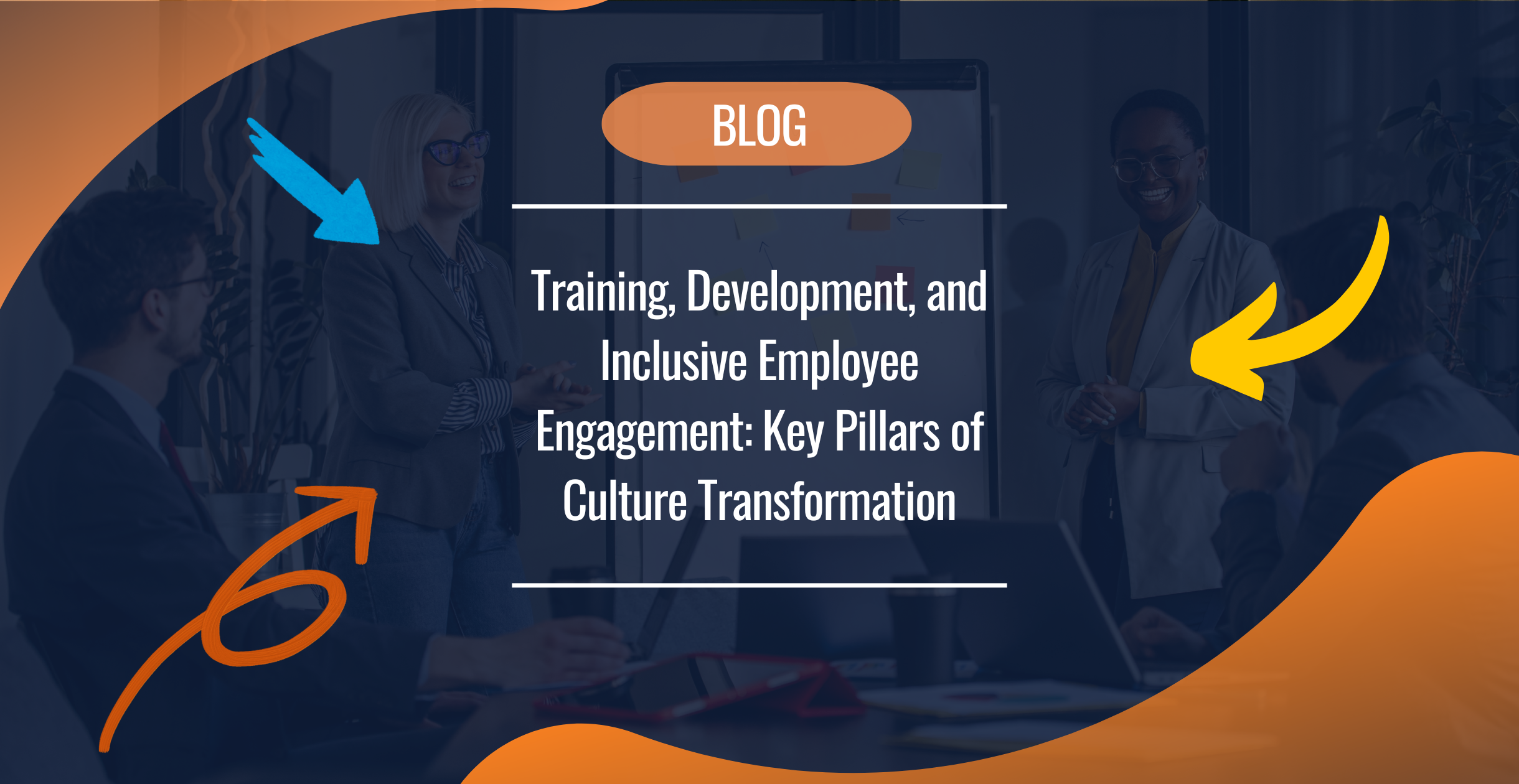Organizations are more focused than ever on adapting to changes, embracing innovation, and fostering a culture that supports growth. The critical elements in achieving this transformation are robust training and development programs, employee engagement opportunities, and inclusion initiatives. These aspects are pivotal in ensuring an organization remains competitive while cultivating a positive, holistic work environment. They can significantly enhance organizational success when aligned with a culture transformation strategy. Here’s a deep dive into their importance, the connection to culture transformation, and how a consulting company can help organizations reach their goals.
The Importance of Training and Development in Culture Transformation
Training and development are fundamental components of an organization’s growth strategy. They involve equipping employees with the necessary skills, knowledge, and tools to perform their roles effectively while encouraging continuous improvement and personal growth. Here are a few reasons why training and development are crucial:
- Skill Enhancement: Effective training programs help employees develop and refine new skills. This is particularly important in today’s dynamic market, where technological advancements and evolving customer needs require an adaptable and proficient workforce.
- Employee Retention: Investing in employee development contributes to job satisfaction, a key driver for retention. Employees who see a path for growth and development within an organization will likely stay longer and feel a sense of loyalty.
- Boosting Productivity: Well-trained employees tend to be more confident in their roles, leading to improved efficiency and productivity. Employees who feel capable can deliver better results, contributing directly to the company’s success.
- Adaptability to Change: As organizations undergo culture transformation, training programs can help employees adjust to new expectations and changes in the organizational structure, making transitions smoother.
- Cohesion and Consistent Information: Training and development ensure that all employees receive the same information, fostering a cohesive work environment. Organizations empower teams to work collaboratively and align their efforts toward shared goals by providing consistent information and resources.
Training and development programs set the foundation for a more engaged, confident, and skilled workforce, driving the culture change that organizations often seek to achieve.
The Role of Inclusive Employee Engagement in Culture Transformation
Inclusive employee engagement is crucial for creating a thriving work environment where every individual feels valued, heard, and involved. Engagement refers to employees’ commitment and enthusiasm towards their work and organization. At the same time, inclusion actively encourages every team member to participate and contribute their unique perspectives, ensuring that diverse backgrounds and perspectives are valued and integrated into the organization.
Here’s why they matter:
- Enhanced Collaboration: When employees are engaged and feel included, they are more likely to collaborate effectively, share ideas, and contribute to problem-solving. A culture of inclusion fosters open communication and innovation, which is critical for business success.
- Positive Workplace Culture: Focusing on inclusive engagement contributes to a positive work environment where employees feel respected and appreciated. This helps build a positive organizational culture where all employees take pride in their work.
- Improved Employee Well-being: Employees who feel engaged and valued experience lower stress levels and greater well-being. This not only supports individual performance but also reduces burnout and absenteeism.
- Diverse Perspectives: Inclusion encourages diverse viewpoints, which can lead to more innovative solutions and better decision-making. Embracing diverse perspectives and inclusive practices within the workplace enables organizations to understand better and meet the needs of a broad customer base.
Organizations prioritizing inclusive employee engagement are more likely to maintain a motivated workforce that actively contributes to achieving the company’s mission and vision.
Connecting Training and Development and Inclusive Employee Engagement to Culture Transformation
Culture transformation reshapes an organization’s core values, behaviors, and beliefs to create a positive and adaptive culture supporting long-term growth. A successful culture transformation requires alignment between an organization’s mission, vision, and values and the day-to-day experiences of its employees. Here’s how training and development and inclusive employee engagement are integral to this process:
- Building a Learning Culture: Establishing a learning culture is essential for culture transformation to take root. Training and development programs foster this environment by encouraging continuous learning and adaptability, empowering employees to embrace new ways of thinking and adopt behaviors that align with the desired culture. Additionally, ensuring that all employees have access to the same information during change is crucial for maintaining cohesion and understanding.
- Engaging Employees in Change: Employees are more likely to support change when they feel involved and understand its purpose. Efforts to connect staff with the organization’s vision foster a sense of ownership in the culture transformation process.
- Promoting Inclusion in Change Management: When undergoing cultural change, it’s crucial to ensure that diverse voices are included and respected in the dialogue. An inclusive approach ensures that change is not just top-down but also reflective of the organization’s diverse needs, experiences, and perspectives. This creates a sense of belonging, which is critical for sustainable transformation.
- Reinforcing New Behaviors: Training programs can also be designed to reinforce the behaviors that align with the transformed culture, such as collaboration, innovation, and equity. It strengthens the transformation effort when employees are consistently trained and motivated to align their actions with the organization’s new cultural values.
Training and development are not standalone efforts but intertwined with the larger goal of culture change. Likewise, inclusive employee engagement is critical to the long-term success of culture transformation. They create a cohesive environment where change can thrive, leading to long-term success and stability.
How a Consulting Company Can Facilitate This Journey
Organizations often find the path to effective culture transformation challenging due to the need for strategic alignment, expertise, and objective guidance. This is where a consulting company specializing in organizational management and culture change can play a transformative role. Here’s how:
- Assessment and Strategy Development: Consultants can begin by assessing the current culture, identifying gaps, and understanding an organization’s unique challenges. They help craft a tailored training and development strategy and design engagement programs that align with the desired culture. An external perspective allows organizations to accurately assess their present state, define their goals, and receive objective insights on the most effective path forward.
- Custom Training Programs: A consulting firm can create customized training modules that address specific skills and competencies required for the culture transformation. This could include leadership development, change management, or diversity, equity, and inclusion training, which are critical for guiding employees through the transition and fostering their long-term commitment to the change, ultimately supporting retention.
- Facilitating Engagement Initiatives: Consultants can design and implement employee engagement initiatives that foster a sense of community and purpose. This might include employee surveys, focus groups, and interactive workshops that ensure employees feel heard and valued during the transformation process. Establishing these feedback loops is essential for driving growth, innovation, and meaningful change.
- Building Inclusive Practices: Consulting companies can provide expertise in inclusive leadership and diversity, equity, and inclusion training, helping to weave inclusivity into the organization’s fabric. This includes creating policies, processes, and practices that ensure equitable opportunities and foster a welcoming environment for all employees. This approach enhances satisfaction and retention while harnessing diverse perspectives to drive innovation and success.
- Measuring Success: A key part of the consulting role is to help organizations measure the impact of their culture transformation efforts. By establishing performance metrics and conducting regular evaluations, consultants can ensure that the training, engagement, and inclusivity strategies yield the desired results. A consulting firm can serve as your accountability partner, helping to ensure progress, commitment, and sustained dedication toward achieving your goals.
A consulting company acts as a strategic partner, guiding organizations through the complexities of change and ensuring that their efforts align with the broader goal of cultural transformation.
Training and development and inclusive employee engagement are essential elements in the journey of cultural transformation. They provide the foundation for a skilled, motivated, and inclusive workforce that can adapt to new challenges and drive an organization toward success. By leveraging the expertise of a consulting firm, organizations can ensure that these initiatives are strategically aligned with their goals, leading to a more resilient and adaptive culture. Ultimately, it’s about creating a workplace where continuous learning, employee well-being, and inclusivity go hand in hand with achieving long-term business objectives.







